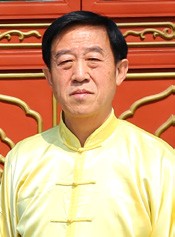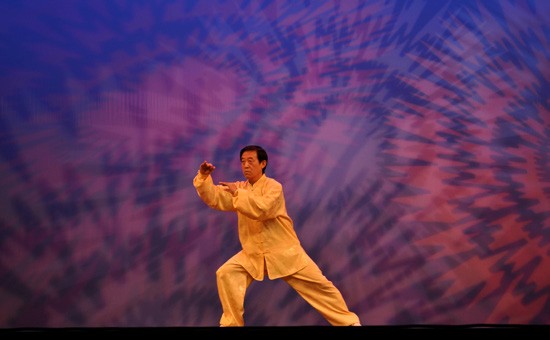Grandmaster Chen Zhenglei
 The 2014 Symposium features Grandmasters from five main styles of Tai Chi Chuan. Chen Style, originating from Chen Wangting (1600-1680), is a style that is often demonstrated more dynamically than other styles. The rhythm of movement changes frequently and includes brief stopping for gathering energy before releasing energy back to the opponent. Externally it appears quite dynamic and martial with coordinated stomping and fist-pounding for a sudden release of energy. Chen Style is also characterized by a more visible emphasis on silk reeling than other Tai Chi styles.
The 2014 Symposium features Grandmasters from five main styles of Tai Chi Chuan. Chen Style, originating from Chen Wangting (1600-1680), is a style that is often demonstrated more dynamically than other styles. The rhythm of movement changes frequently and includes brief stopping for gathering energy before releasing energy back to the opponent. Externally it appears quite dynamic and martial with coordinated stomping and fist-pounding for a sudden release of energy. Chen Style is also characterized by a more visible emphasis on silk reeling than other Tai Chi styles.
Chen Style Tai Chi Chuan will be represented at the Symposium by Grandmaster Chen Zhenglei. He was born into a family with over 300 years of martial arts tradition and is widely recognized as one of the leading representatives of Chen Style Tai Chi Chuan in the world today.
Grandmaster Chen Zhenglei is a 19th generation descendant of the Chen family and the 11th generation direct-line successor of Chen Family Tai Chi Chuan. He was born in 1949 in Chenjiagou, Wen County, Henan Province, China. He began studying when he was 8 years old with his uncle Chen Zhaopei (1893-1972) who was his main instructor. He later studied with another uncle, Chen Zhaokui (1928-1981), the son of Chen Fake.
From 1974 to 1987, Grandmaster Chen Zhenglei won numerous gold medals in competitions and also successfully defended his title as Grand Champion of Tai Chi Chuan in two consecutive National Tai Chi Chuan competitions. Since 1983 he has travelled extensively at the international level and has tens of thousands of students worldwide. Devoted to the teaching of his art, Grandmaster Chen has authored a wide series of Chen Style Tai Chi Chuan books and DVDs covering all traditional forms and weapons. These training materials are highly regarded in the world of Tai Chi Chuan and have been translated into many languages. He has also authored many important articles and books explaining Tai Chi’s theory, fundamentals, and relationship to the Chinese meridian system.
Grandmaster Chen Zhenglei has held many important administrative roles in various martial arts organizations, including the head coach at the Chen Village National Tai Chi Center. Currently, he is the vice-president of the Chen Family Tai Chi Chuan Association of Henan Province and the director of the Chen Village Tai Chi Chuan Training Center of Zhengzhou. He is also a committee member of the Chinese Wushu Association, the vice-chairman of the Henan Province Wushu Association, a senior National Wushu Master, and a committee member of the Chinese Sports and Science Institute. In recent years, Grandmaster Chen has continued to receive many important honors. In 1995, he was officially recognized as one of China’s modern day Top Ten Martial Arts Masters.
In 2011, he received the distinction of being on the Cambridge List of the Most Distinguished Chinese People in the World. Recently, in 2012, he was certified as a 9th Duan Tai Chi Master by the Chinese Wushu Association. Only a handful of Tai Chi Masters in the world hold the prestigious rank of 9th Duan, the highest rank, and most earn their title later in life. One of the most skillful Tai Chi Masters in the world, it is an honor to have Grandmaster Chen Zhenglei participate in the 2014 Symposium.
 A Conversation with Grandmaster Chen Zhenglei
A Conversation with Grandmaster Chen Zhenglei
In Issue #20 (2006), the International Yang Family Tai Chi Chuan Association Journal published an interview with Grandmaster Chen Zhenglei by Dave Barrett. A portion of this interview is reprinted below:
DB: My first teacher always encouraged us by saying “Catch the feeling!” Sometimes the feeling is there for just a small part of a sequence, but maybe with the next practice a little bit more.
CZ: In my experience with Western students, I know that sometimes they only practice once a week, sometimes twice or three times a week. Because they don’t practice every day, this kind of feeling develops very slowly. In China we say that if you practice for one day you get one day’s benefit. With daily practice you can steadily improve. If you don’t practice for one day you lose ten days of development. So practice every day without stopping. Western students must understand this clearly. Practice every day! Not once or twice a week.
DB: When you practice today and you hear the voice of your teacher in your mind, what is he saying?
CZ: In my younger years when I practiced, I was quite serious about my work. My whole life I have followed the teachings of my uncles, Chen Zhaopei and Chen Zhaokui. When they taught I always watched very carefully. At that time my deep feeling was that I wanted to grow up to be like them. I listened to their voices and watched their motions closely. At that time there were no recorders or video cameras. My eyes were the camera and my mind was the recorder. If I needed to check something, I would sit down, close my eyes and review. If I was not satisfied with my practice, I would check my memories and think about my uncles. Sometimes I would hear them criticizing my efforts using rough language to spur my practice onwards.
DB: So you still hear this?
CZ:Yes, even now when I may not want to practice I hear my uncles’ voices pushing me, giving me energy to practice. It doesn’t matter what difficulties I’ve been through. In the 1980s when I met people who wished to challenge me, I’d hear my uncles giving me confidence to win these challenges.
Throughout my career, I have been through five stages. First, when I was a farmer up to the time I was 25 years old I was studying with my uncles. The next ten years I was working in a factory while continuing my martial arts training. I was traveling around as a salesman and I made contacts with other teachers and I was able to benefit from these friendships and improve our factory sales. During these ten years, I would often represent our village at competitions. The third stage found me working with national sports officials and I became a professional coach. I continued my training and began to teach a large number of students, some of whom won many competition honors. In the fourth stage, I began to organize regional and national competitions. Now at the fifth stage, I’ve got a job I really like, traveling internationally and sharing my family traditions.
When I was living in Chenjiagou, I focused on my own training and my individual duty to our family. At the second stage I began to travel and see that perhaps there might be a career in the martial arts. In the third and fourth periods, because I met many other teachers and was working as a player, coach and manager, I began to realize this could be a very good family business as well. Now that I travel internationally meeting many people who have a love of this art, now my focus is on how we can spread Tai Chi Chuan. I’ve been working on books and videos and I feel a true calling to this work. It is more than just a business. I’ve been fortunate to receive recognition within China as one of the top ten Masters and I’m getting a lot of support from my students and no longer have to work a factory job. Now that China is open, I wish to spread traditional Chinese arts throughout the world so that more people can enjoy Tai Chi Chuan practice.
